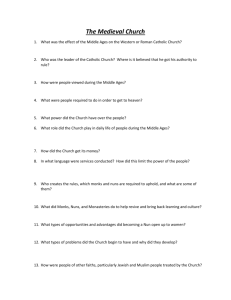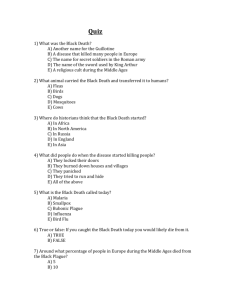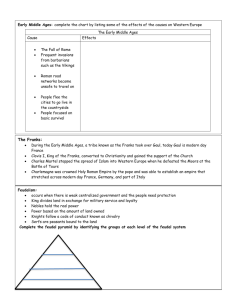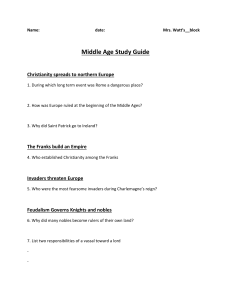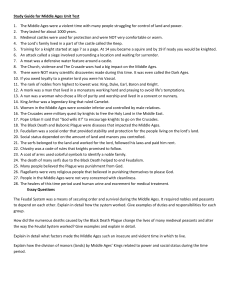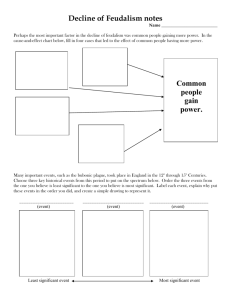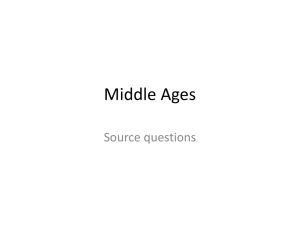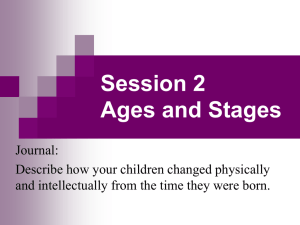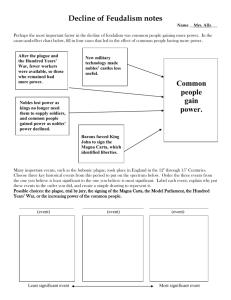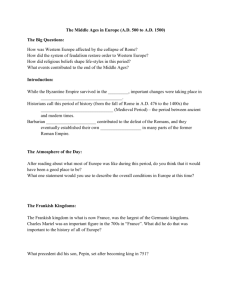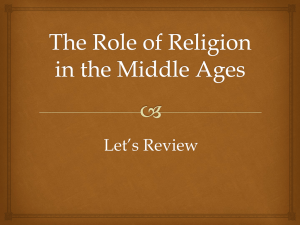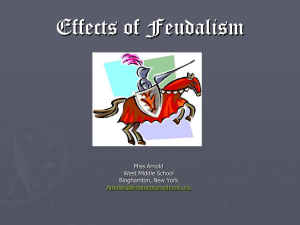Middle ages study guide 2015
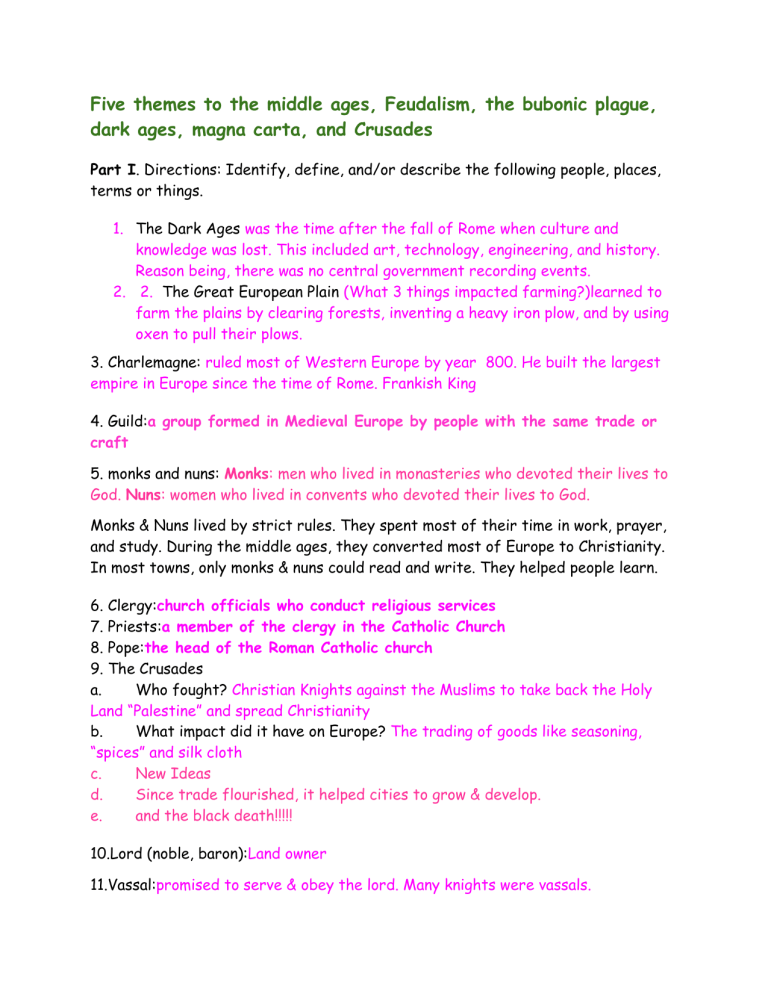
Five themes to the middle ages, Feudalism, the bubonic plague, dark ages, magna carta, and Crusades
Part I. Directions: Identify, define, and/or describe the following people, places, terms or things.
1.
The Dark Ages was the time after the fall of Rome when culture and knowledge was lost. This included art, technology, engineering, and history.
Reason being, there was no central government recording events.
2.
2. The Great European Plain (What 3 things impacted farming?)learned to farm the plains by clearing forests, inventing a heavy iron plow, and by using oxen to pull their plows.
3. Charlemagne: ruled most of Western Europe by year 800. He built the largest empire in Europe since the time of Rome. Frankish King
4. Guild: a group formed in Medieval Europe by people with the same trade or craft
5. monks and nuns: Monks: men who lived in monasteries who devoted their lives to
God. Nuns: women who lived in convents who devoted their lives to God.
Monks & Nuns lived by strict rules. They spent most of their time in work, prayer, and study. During the middle ages, they converted most of Europe to Christianity.
In most towns, only monks & nuns could read and write. They helped people learn.
6. Clergy: church officials who conduct religious services
7. Priests: a member of the clergy in the Catholic Church
8. Pope: the head of the Roman Catholic church
9. The Crusades a.
Who fought? Christian Knights against the Muslims to take back the Holy
Land “Palestine” and spread Christianity b.
What impact did it have on Europe? The trading of goods like seasoning,
“spices” and silk cloth c.
New Ideas d.
Since trade flourished, it helped cities to grow & develop. e.
and the black death!!!!!
10.Lord (noble, baron): Land owner
11.Vassal: promised to serve & obey the lord. Many knights were vassals.
12. Serf/peasant poorest class, farmers who lived & worked on the land
13. monarchy: is a govt. headed by a king or queen.
14 The Magna Carta: a list of political rights written by England’s nobles and signed by King John
15. Parliament: a governing body made up of a group of representatives
16.The Bubonic Plague (Black Death): The bubonic plague is a disease that is caused by bacteria that lives in rodents such as rats. When a flea bites a rat, it ingests some of the rat’s infected blood. Then the same flea bites a person and injects the diseased blood into them.
17. The Hundred Years War: War between France & England mainly over land by which the French eventually drove the English out and won the war.
18.Joan of Arc: was a girl who asked to see the king of France because she had been hearing voices from heaven that she could save France. She was captured & burned to death by the English.
19. Manor: a lord’s estate
20. Excommunicated: means you were cut off from the church). This was terrible for these people because all hope of going to heaven was now gone.
21. King John: caused the collapse of feudalism when the nobles rebelled against him and forced him to sign the magna cart.
22. Alfred the Great: Created peace with the Vikings, build England's navy improved learning. Basically made England a superpower
23.Germanic Tribes (list them): 1. Visigoths (Spain) 2. The Franks (France) 3.
Anglo-Saxons (England/ United Kingdom)
24. William the Conqueror:
t he Normans invaded England. They won a battle at a town called Hasting. The Normans (French) became the new rulers of England, and
William became the first Norman (French) king of England. This event is called the
Norman Conquest
Part II. Answer the following questions:
1.
Describe feudalism and how it worked. Draw and label the Feudal Pyramid.
How did feudalism affect the people of the Middle Ages?
Is a system of government that developed in the Middle Ages in Europe. It was a social structure needed for survival.
1.
Did Feudalism work as a system of government? Why or Why not? (There is not a right or wrong answer to this as long as you can support your answer with facts.)
1.
Describe the influence and power of the church during the Middle Ages. In every town or village there was a church and daily life was centered around the church bells. The priest was an important part of village life. If the townspeople did not pay part of their wages to the church they would have been breaking the rules of the church
1.
What would happen to someone who had the Bubonic Plague? The plague is sometimes called the “black death” because once a person was infected, black spots would develop on his or her skin. spread by fleas on rats and killed 50% of the population. Only stopped by the Great Fire of England.
1.
What role did the Middle Ages play between the ancient and modern worlds?
The Middle Ages is a period of time that links the ancient and modern worlds
